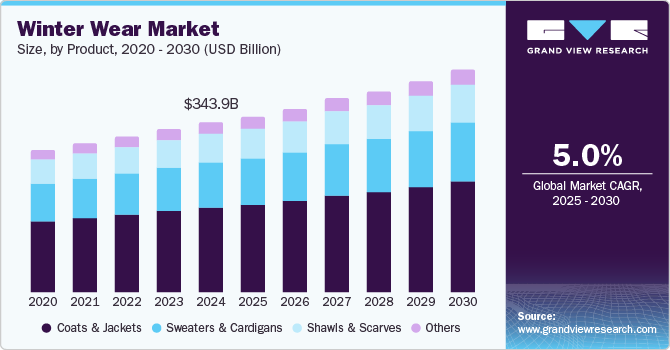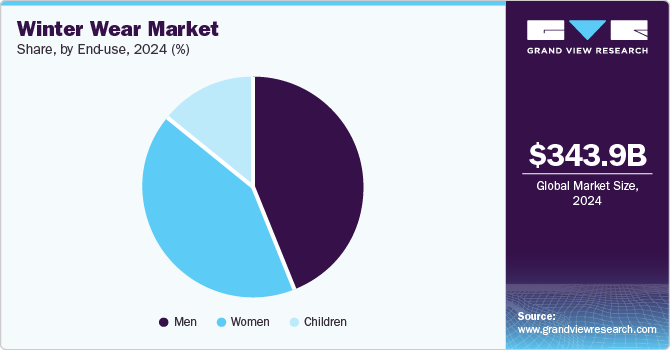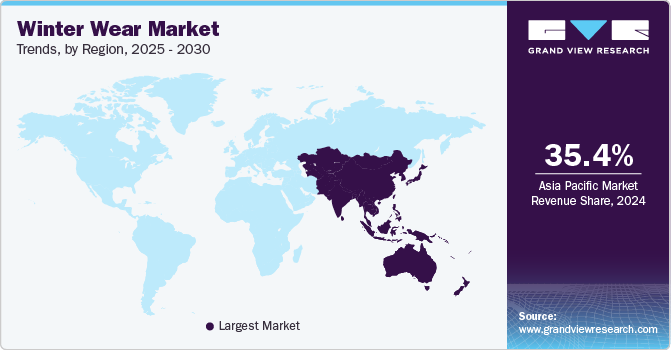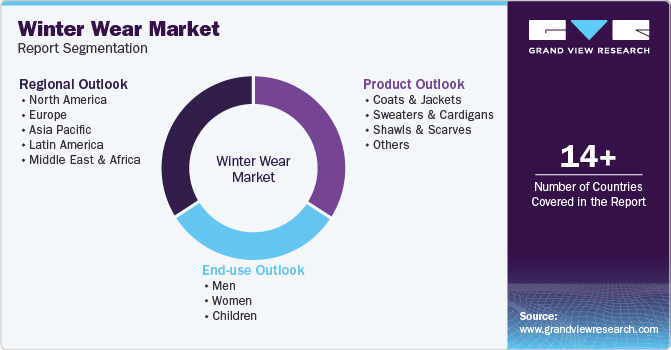- Home
- »
- Clothing, Footwear & Accessories
- »
-
Winter Wear Market Size And Share, Industry Report, 2030GVR Report cover
![Winter Wear Market Size, Share & Trends Report]()
Winter Wear Market (2025 - 2030) Size, Share & Trends Analysis Report By Product (Coats & Jackets, Sweaters & Cardigans, Shawls & Scarves), By End Use (Men, Women, Children), By Region, And Segment Forecasts
- Report ID: GVR-3-68038-168-9
- Number of Report Pages: 100
- Format: PDF
- Historical Range: 2018 - 2023
- Forecast Period: 2025 - 2030
- Industry: Consumer Goods
- Report Summary
- Table of Contents
- Segmentation
- Methodology
- Download FREE Sample
-
Download Sample Report
- Winter Wear Market Summary
The global winter wear market size was estimated at USD 343.87 billion in 2023 and is projected to reach USD 458.6 billion by 2030, growing at a CAGR of 5.0% from 2025 to 2030. This growth is attributed to changing weather patterns, increased consumer awareness regarding winter sports and travel, and the rising demand for fashionable yet functional winter apparel.
Key Market Trends & Insights
- The Asia Pacific winter wear market held the largest revenue share of 35.4% in 2024.
- The China winter wear market dominated Asia Pacific in 2024.
- By product, the coats & jackets segment held the largest revenue share of 51.2% in the winter wear industry in 2024
- By end use, the men segment held the largest market share in the winter wear industry.
- By product, the sweaters & cardigans segment is expected to grow at the highest CAGR over the forecast period.
Market Size & Forecast
- 2024 Market Size: USD 343.87 Billion
- 2030 Projected Market Size: USD 458.6 Billion
- CAGR (2025-2030): 5.0%
- Asia Pacific: Largest market in 2024
As climate change leads to more unpredictable weather, consumers are increasingly investing in high-quality winter wear that provides warmth and reflects their style.

The trend of winter tourism is favoring the winter wear industry worldwide. The rising popularity of snowy travel destinations has resulted in a significant increase in demand for winter apparel. For instance, countries including Japan and Switzerland have seen an influx of tourists during winter, leading to increased sales of jackets and accessories tailored for cold weather. This trend highlights a shift in consumer behavior, where travel experiences are closely linked with the need for appropriate attire, thus boosting the winter wear industry.
The rise in disposable income across various regions, particularly in Asia Pacific countries such as China and India, has empowered consumers to spend more on premium winter wear. As urbanization and the impact of social media continue to grow, there is increased exposure to international fashion trends that influence purchasing decisions. Consumers are looking for functional clothing and stylish designs that can be worn in multiple settings. This dual demand for aesthetics and practicality is prompting brands to innovate and diversify their product offerings.
Sustainability is becoming a crucial consideration for many buyers when choosing apparel. Many buyers are now inclined toward brands that prioritize eco-friendly materials and ethical manufacturing practices. This shift is prompting companies to adapt their strategies to meet the changing expectations of consumers. For example, brands such as Patagonia have gained popularity by emphasizing sustainable practices while offering high-performance winter apparel. Such initiatives appeal to environmentally conscious consumers and contribute positively to brand loyalty, assisting market players in the winter wear industry to stay abreast of the competition.
Product Insights
The coats & jackets segment held the largest revenue share of 51.2% in the winter wear industry in 2024, primarily due to their effectiveness in providing warmth and protection against harsh weather conditions. The versatility of these garments makes them suitable for various activities, such as outdoor sports, casual outings, and formal occasions. In addition, the availability of winter apparel in innovative materials and designs, such as lightweight insulated jackets that offer warmth without bulk, has attracted consumers seeking comfort and fashion. Overall, the combination of practicality, style diversity, and consumer demand for multifunctional apparel drives the robust performance of the coats and jackets segment in the winter wear market.
The sweaters & cardigans segment is expected to grow at the highest CAGR over the forecast period due to their versatility, making them suitable for various occasions, from casual outings to professional settings. Their lightweight nature allows for easy layering, which appeals to consumers seeking comfort without a bulky appearance. For instance, cardigans can be worn over a simple T-shirt for a casual look or paired with a blouse for a more polished appearance. Innovations in fabric technology, such as moisture-wicking and temperature-regulating materials, further enhance their appeal.
End Use Insights
The men segment held the largest market share in the winter wear industry, owing to increasing fashion consciousness and heightened interest in stylish winter apparel that combines functionality with contemporary designs. This shift is reflected in the wide variety of products available, including jackets, coats, and sweaters, which are tailored to men's preferences. The acceptance of jackets as both casual and business attire has significantly boosted their demand in the men’s apparel segment. Moreover, the rising popularity of outdoor activities and winter sports has prompted men to seek high-performance winter wear that meets their active lifestyles. Retailers are also offering a wider range of options, catering to diverse needs and further driving the winter wear industry.

The women segment is expected to grow at the fastest CAGR over the forecast period due to the increasing popularity of winter apparel and accessories such as sweaters, shawls, hoodies, headbands, and scarves. Women are increasingly purchasing winter wear for warmth and as a fashion statement, as the latest clothing pieces are extremely versatile and suitable for varied occasions. For instance, the popularity of stylish insulated jackets and blazers that can easily transition from formal events during the day to casual outings at night has significantly boosted their sales. The rise of e-commerce platforms has made it easier for women to access a wider variety of trendy winter wear options, further driving growth in this segment.
Regional Insights
The Asia Pacific winter wear market held the largest revenue share of 35.4% in 2024 due to the region's diverse climate conditions, including colder winters in northern areas and unpredictable weather patterns. A large population base, particularly in countries such as China and India, has further increased demand for winter apparel. The changing weather patterns and the rise of winter tourism in countries such as Japan and South Korea have further boosted market growth. For instance, Japan's ski resorts attract millions of tourists each winter, leading to a surge in demand for high-quality winter apparel among both locals and visitors. Furthermore, evolving fashion trends and the rising middle-class population are encouraging most consumers to invest in premium winter wear, enhancing their overall experience during the cold months. This combination of demographic factors, climatic conditions, and rising disposable incomes positions the Asia Pacific region as a global winter wear market leader.

China Winter Wear Market Trends
The China winter wear market dominated Asia Pacific in 2024 with the largest revenue share, driven by the rapidly growing middle class with increased disposable income and the shifted consumer preferences toward high-quality and fashionable winter apparel. The popularity of winter sports spurred by events such as the Beijing 2022 Winter Olympics has also heightened the demand for specialized winter clothing, such as down jackets and thermal wear. Furthermore, the diverse climate across China, with colder regions experiencing harsh winters, necessitates a wide range of winter wear options. This combination of economic growth, cultural shifts toward outdoor activities, and varying climate conditions positions China as a leader in the winter wear market within the Asia Pacific region.
Middle East & Africa Winter Wear Market Trends
The Middle East & Africa winter wear market is expected to grow at the fastest CAGR of 7.4% over the forecast period due to increasing awareness regarding climate change. Unpredictable weather patterns and colder temperatures in certain regions are prompting consumers to invest in winter apparel. South Africa and the United Arab Emirates have experienced sudden drops in temperature, boosting the demand for winter clothing. Furthermore, the influence of global fashion trends and marketing campaigns has heightened consumer interest in stylish winter wear, contributing to the market's robust growth in this region.
North America Winter Wear Market Trends
The North America winter wear market is expected to grow significantly over the forecast period due to a combination of factors. The increasing availability of stylish and functional winter wear, the rising influence of social media platforms, unpredictable weather patterns, and colder temperatures are all expected to play a significant role in shaping consumer preferences. The popularity of outdoor activities, such as skiing and snowboarding, is also expected to drive the demand for winter apparel tailored for such activities. Environmental factors, changes in lifestyle, and improved shopping accessibility are expected to drive significant growth in the winter wear market in North America in the coming years.
The U.S. winter wear market dominated North America, driven by states including Colorado and Vermont, which are renowned for their ski resorts. The popularity of winter activities in the country has played a key role in the demand for specialized winter gear among both locals and tourists. In addition, the rise of e-commerce has made it easier for consumers to access a vast selection of winter wear and compare the products and prices conveniently. The U.S. market is also characterized by a robust retail infrastructure and established brands that continuously innovate in terms of style and functionality.
Key Winter Wear Company Insights
Some key players in the winter wear market are Gap Inc.; VF Corporation; Columbia Sportswear Company.; The North Face, Inc.; Patagonia, Inc.; Zara SA; Arc' Teryx Equipment, Inc.; Recreational Equipment, Inc.; Wintergreen Northern Wear; and J.Crew. These companies employ various strategies to maintain a competitive edge, focusing on product innovation and sustainability. They launch advanced winter apparel featuring high-performance materials such as waterproof fabrics and thermal insulation, meeting consumer demands for both functionality and style.
-
Columbia Sportswear Company specializes in high-performance outdoor apparel, offering a wide range of winter wear designed to withstand extreme weather conditions. The company integrates innovative technologies, such as Omni-Heat thermal reflective materials and waterproof fabrics, to enhance the functionality of its products. By focusing on durability and comfort, Columbia provides consumers with winter clothing that meets the demands of outdoor activities, including skiing and hiking.
-
Patagonia, Inc. emphasizes using recycled materials and environmentally friendly production processes, ensuring its products have a minimal ecological footprint. Patagonia’s winter apparel is designed for performance in harsh conditions and longevity, encouraging consumers to invest in durable clothing that reduces waste. In addition, the company actively engages in social and environmental activism, further enhancing its brand appeal among consumers who prioritize corporate responsibility.
Key Winter Wear Companies:
The following are the leading companies in the winter wear market. These companies collectively hold the largest market share and dictate industry trends.
- Gap Inc.
- VF Corporation
- Columbia Sportswear Company.
- The North Face, Inc.
- Patagonia, Inc.
- Zara SA
- Arc' Teryx Equipment, Inc.
- Recreational Equipment, Inc.
- Wintergreen Northern Wear
- J.Crew
Recent Developments
-
In November 2024, Zara launched its SRPLS collection for Autumn/Winter, showcasing a range of utilitarian-inspired pieces that reflect a blend of functionality and contemporary style. This collection features oversized silhouettes, practical details, and a muted color palette, emphasizing comfort and versatility for modern consumers. Key items include oversized jackets and cargo pants designed to cater to the growing demand for streetwear aesthetics while maintaining a chic appeal.
-
In October 2024, Gap Inc. launched a limited-edition "Wicked" capsule collection featuring 20 pieces inspired by the upcoming film adaptation of the popular musical. The collection showcases colorways central to Elphaba and Glinda's characters, including green, pink, and black. Key items include graphic tees, hoodies, and accessories such as socks and beanies. This collection aims to attract musical fans while providing cozy and stylish options for the winter season.
Winter Wear Market Report Scope
Report Attribute
Details
Market size value in 2025
USD 359.8 billion
Revenue forecast in 2030
USD 458.6 billion
Growth rate
CAGR of 5.0% from 2025 to 2030
Base year for estimation
2024
Historical data
2018 - 2023
Forecast period
2025 - 2030
Quantitative units
Revenue in USD billion/million, and CAGR from 2025 to 2030
Report coverage
Revenue forecast, company ranking, competitive landscape, growth factors, and trends
Segments covered
Product, end use, region
Regional scope
North America, Europe, Asia Pacific, Latin America, MEA
Country scope
U.S., Canada, Mexico, Germany, UK, France, Italy, Spain, China, Japan, India, Australia, Brazil, South Africa
Key companies profiled
Gap Inc.; VF Corporation; Columbia Sportswear Company.; The North Face, Inc.; Patagonia, Inc.; Zara SA; Arc' Teryx Equipment, Inc.; Recreational Equipment, Inc.; Wintergreen Northern Wear; J.Crew
Customization scope
Free report customization (equivalent up to 8 analysts working days) with purchase. Addition or alteration to country, regional & segment scope.
Pricing and purchase options
Avail customized purchase options to meet your exact research needs. Explore purchase options
Global Winter Wear Market Report Segmentation
This report forecasts revenue growth at global, regional, and country levels and provides an analysis of the latest industry trends in each of the sub-segments from 2018 to 2030. For this study, Grand View Research has segmented the global winter wear market report based on product, end use, and region:

-
Product Outlook (Revenue, USD Million, 2018 - 2030)
-
Coats & Jackets
-
Sweaters & Cardigans
-
Shawls & Scarves
-
Others
-
-
End Use Outlook (Revenue, USD Million, 2018 - 2030)
-
Men
-
Women
-
Children
-
-
Regional Outlook (Revenue, USD Million, 2018 - 2030)
-
North America
-
U.S.
-
Canada
-
Mexico
-
-
Europe
-
Germany
-
UK
-
France
-
Italy
-
Spain
-
-
Asia Pacific
-
China
-
Japan
-
India
-
Australia
-
-
Latin America
-
Brazil
-
-
Middle East and Africa (MEA)
-
South Africa
-
-
Share this report with your colleague or friend.
Need a Tailored Report?
Customize this report to your needs — add regions, segments, or data points, with 20% free customization.

ISO 9001:2015 & 27001:2022 Certified
We are GDPR and CCPA compliant! Your transaction & personal information is safe and secure. For more details, please read our privacy policy.
Trusted market insights - try a free sample
See how our reports are structured and why industry leaders rely on Grand View Research. Get a free sample or ask us to tailor this report to your needs.










